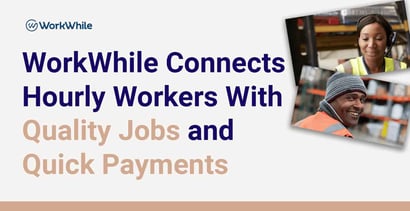
In a Nutshell: WorkWhile is a unique labor marketplace that puts hourly workers in charge of which jobs they accept. Workers also receive payment the next day after completing a shift. Employers list opportunities, hours, and pay, and WorkWhile users can sign up for shifts with no long-term commitment. After completing the onboarding process, users receive offers that match their skills and preferences. And workers who reliably complete shifts are eligible for payment bonuses and earn sick pay.
The COVID-19 pandemic hit low-wage and hourly workers the hardest. More than 8 million of those workers abruptly lost their jobs in spring 2020, and the sector still had not recovered more than a year later.
WorkWhile launched in the spring of 2020 and became a saving grace for some of those laid-off workers. The platform is a worker-centric job marketplace where users can choose jobs and shifts at a fair pay rate.
The company’s mission is to build technology to help hourly workers earn more money and live better lives. WorkWhile saw that hourly workers were often neglected by other big technology companies because most of their workers had never worked hourly jobs.
Jarah Euston, WorkWhile Founder and CEO, worked hourly jobs growing up. She said she understands how tough it can be to make ends meet at a job that has inconsistent hours — which also means inconsistent paychecks.
“I had a whole host of hourly wage jobs,” Euston said. “I wanted to do something that was going to help the 82 million Americans who work hourly wage jobs. That accounts for 58% of the US labor force.”

WorkWhile is currently available in 14 markets and counting, including San Francisco, Los Angeles, Seattle, Dallas, and New York.
Workers interested in shifts can download the WorkWhile app — available on both the Apple App Store and the Google Play Store. Users go through a quick onboarding process that takes about 30 minutes before they are able to browse and select jobs.
The onboarding process helps the platform understand a worker’s interest in jobs and how motivated they are. The process includes a mandatory virtual orientation and a basic criminal background check when workers are booked to work their first shift.
After onboarding, users can sign in to their accounts watch an orientation video as part of the onboarding process. Users can start opting in to shifts as soon as they finish.
“You’re going to see a menu of options, depending on what’s available in the city where you live,” Euston said. “It’s up to the worker to decide how they want to craft their schedule. If they want to work mornings or evenings or if they want to do driving shifts, the power is in the worker’s hands.”
An Hourly Labor Marketplace That Caters to Workers
WorkWhile uses a comprehensive algorithm that understands a worker’s job experience to match them to employers looking for their skills. During the onboarding process, workers can specify their work experience, special qualifications, and certifications.
The algorithm is critical to WorkWhile’s operation. The company said it helps it understand what types of jobs the user is most qualified for.
“It’s not the case that you have to input your schedule and tell us exactly when you want to work,” Euston said. “It’s more of a menu that you’re presented with. You get to opt-in to the ones that you like.”
The algorithm updates in real time and will recommend jobs tailored to the user’s skill set as they complete more jobs.

After every shift, the worker and the employer review the job and how well it was done and submit their reviews to WorkWhile. The platform uses that information to understand what the worker likes and what they’re good at while also offering priority job access to their top workers.
“As you build up experience with specific businesses that are on the platform, you get first dibs at those types of positions,” Euston said. “The more experience and higher rating you have on the platform, the more job opportunities you will have first access to.”
The majority of people on the platform are looking to build a 40-hour work week. WorkWhile said it’s common for workers to divide their time working with multiple companies throughout the week.
The pandemic accelerated the shift to offer more flexible schedules. WorkWhile said its platform is a great tool to help businesses find reliable, high quality workers for specific jobs.
“Every worker needs that flexibility and power to live their lives,” Euston said. “We created the company because we recognize that you need to work while you’re raising your family or going to school or dealing with other things that are going on.”
Helping Employees Improve Their Financial Situations
Most jobs on the platform are light industrial, including warehousing, general labor, or last-mile courier positions. Workers interested in jobs that require special certifications will soon be able to learn those skills and earn high-paying jobs on the platform.
The skill-learning program is made up of short modules that workers can finish in quick spurts. Workers receive a new badge on their profile for every skill module they complete, earning them more per job.
WorkWhile is piloting an elite worker program for its most active workers. Users receive priority access to jobs on the app and are eligible for monthly bonuses.

“WorkWhile wants to find the most reliable workers, and then treat those workers better than they’re going to be treated at any other hourly wage job,” Euston said. “We plan to do that by providing all sorts of different perks and benefits to those reliable workers.”
Eligible workers on the platform receive health coverage via a telehealth program that covers primary care, including filling prescriptions. The telehealth platform can also provide a doctor’s notes to excuse a worker for medical reasons.
Even if someone works at multiple companies, they still earn sick pay on WorkWhile’s platform. Every 30 hours worked earns one hour of sick pay. Workers who can’t make a shift can cash out the sick-day credit with no repercussions.
WorkWhile is committed to making sure workers go to quality work environments. The company meets with employers to make sure the job is temperature-controlled, that workers can take breaks appropriately, and that the company has safety requirements in place. If the employer doesn’t pass, they can’t post the job on WorkWhile.
“It’s nothing but positive for workers,” Euston said. “It’s putting control in their hands and giving them the benefits workers have been really hungry for that employers have been slow to roll out.”
WorkWhile: Building Features to Create Better Matches
The main way WorkWhile helps workers is by paying them the next day for every shift they work, and nearly 90% of users use the next-day pay feature. The platform logs the shift as soon as it’s done and users can see their earnings in their account when they clock out.
WorkWhile said its next-day pay feature helps the company retain the best qualified and most reliable workers.
“You worked and earned that money,” Euston said. “We want to give it to you as quickly as possible. You can buy dinner, put gas in your car, or pay your bills on time. We want to make it as easy as possible.”
The company is continuing to invest in ways to get workers paid even faster – specifically as soon as they clock out. WorkWhile also wants to help workers plan their week so when it ends, they’ve met their earning goals.
“We’re trying to make sure that we’re helping you plan your time, and make sure that we have job offerings to help you achieve that,” Euston said.
The next-day pay feature is currently live and the team is still working on the skill learning platform. The company is also looking to add an instant-pay feature and has ambitions to offer a pay advance for its most reliable workers.
WorkWhile looks to former power workers on the platform for its support team. The company actively recruits workers who used the platform so the support team can understand each worker’s specific needs.
“It’s very important for the company to have the workers’ best interest in their mission,” Euston said. That’s been part of our DNA from the very beginning.”






